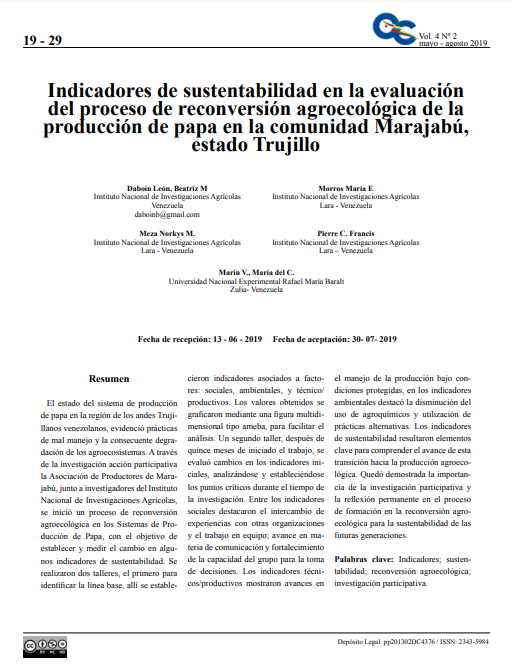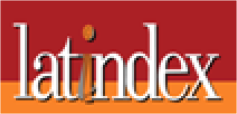Sustainability indicators in the evaluation of the agroecological reconversion process of potato production in the Marajabú community, Trujillo state
Keywords:
Indicators; sustainability; agroecological reconversion; participatory researchAbstract
The state of the potato production system in the region of the Venezuelan Trujillanos Andes evidenced bad management practices and the consequent degradation of agroecosystems. Through participatory action research, the Association of Producers of Marajabú, together with researchers from the National Institute of Agricultural Research, began a process of agroecological reconversion in Potato Production Systems, with the objective of establishing and measuring the change in some sustainability indicators. Two workshops were held, the first to identify the baseline, there were established indicators associated to factors: social, environmental, and technical / productive. The values obtained were plotted
using a multidimensional amoeba figure, to facilitate the analysis. A second workshop, after fifteen months of starting the work, changes in the initial indicators were evaluated, analyzing and establishing the critical points during the time of the investigation. Among the social indicators highlighted the exchange of experiences with other organizations and teamwork; progress in communication and strengthening the group's capacity to take decisions. The technical / productive indicators showed progress in the management of production under protected conditions, the environmental indicators highlighted the decrease in the use of agrochemicals and the use of alternative practices. Sustainability indicators were key elements to understand the progress of this transition towards agroecological production. The importance of participatory research and permanent reflection in the training process in Agroecological reconversion for the sustainability of future generations was demonstrated.
Downloads
References
Altieri, M y Nicholls, C. (2002). Sistema agroecológico rápido de evaluación de calidad de suelo y salud de cultivos en el agroecosistema de café. Universidad de California, Berkeley.
Altieri, M. y Nicholls, C. (2000). Un método agroecológico rápido para la evaluación de la sostenibilidad de cafetales. Manejo Integrado de Plagas y Agroecología (Costa Rica) No. 64, p. 17 – 24.
Astier, M. (2007). Curso Internacional de Agroecología, Medellín- Colombia.
Geilfus F. (1997).80 Herramientas para el Desarrollo Participativo: diagnóstico, planificación, monitoreo, evaluación. Prochalate–IICA, San Salvador, el Salvador. 208 p.
Gliessman, S. y otros (1998). Agroecología: un enfoque sustentable de la agricultura ecológica. ¿Qué es la agroecología?.
Gliessman, S. y otros (2001). Agroecosystem sustainability: developing practical strategies. Book Series Adv. in Agroecology, CRC Press, Boca Raton, FL.
Lerma, H., (2001). Metodología de la Investigación Ecoe Ediciones, Bogotá.
Ley del Plan de la Patria (2013). Segundo Plan Socialista de Desarrollo Económico y Social de la Nación (2013- 2019). Gaceta oficial de la República Bolivariana de Venezuela Nº 6.118.
Marín, M.; Pérez, A; Aranguibel, Y. (2012). Habilidades interpersonales de la comunicación y responsabilidad social en organizaciones educativas. Revista Multiciencias Vol. 12. Nº Extraordinario (221-227) ISSN 1317-2255/dep Legal pp 20000FA828. Universidad del Zulia. Venezuela.
Masera, O., M. Astier y S. López R. (1999). Sustentabilidad y manejo de recursos naturales: el marco de evaluación MESMIS. Mundiprensa, GIRA, UNAM, México.
Moreira, D. y Castro, C. (S/A). Prácticas agroecológicas. En la Producción de Hortalizas y Vegetales. Instituto Interamericano para la Agricultura (IICA). Costa Rica.
Vigo, A. (2002). Hans-Georg Gadamer y la filosofía hermenéutica: la comprensión como ideal y tarea. Revista de Estudios Públicos (87), pp. 235-249. Centro de Estudios Públicos, Santiago, Chile. En: http://www.cepchile.cl/dms/archivo_3145_1043/rev87_vigo.pdf [Acceso en Abril 25, 2016].

Downloads
Published
How to Cite
Issue
Section
License

This work is licensed under a Creative Commons Attribution-NoDerivatives 4.0 International License.







